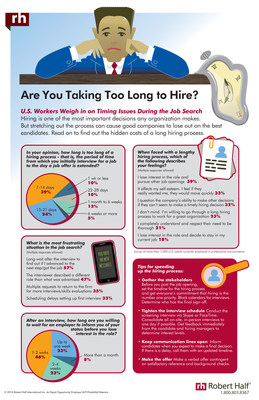Press Releases
Read about our latest research, including results from our ongoing surveys of senior managers and workers, and company announcements.
MENLO PARK, Calif., Aug. 11, 2016 /PRNewswire/ -- Timing is everything, the saying goes, and for firms trying to hire it could make the difference between securing the candidate and losing out. For almost six in ten workers (57 percent) in a Robert Half survey, the most frustrating part of the job search is the long wait after an interview to hear if they got the job. Nearly one-quarter (23 percent) lose interest in the firm if they don't hear back within one week after the initial interview; another 46 percent lose interest if there's no status update from one-to-two weeks post-interview.

View the infographic.
Robert Half's "Time to Hire" survey explored worker sentiment about the job search process, specifically their views about the timeframe between setting up the initial interview and receiving the job offer. More than 1,000 U.S. workers currently employed in office environments were surveyed by an independent research firm for the study.
"Professionals in fields such as compliance, cybersecurity, big data and finance can receive four to six offers within a week," said Paul McDonald, senior executive director of Robert Half. "Candidates with several options often choose the organization that shows the most interest and has an organized recruiting process."
Hiring managers who fail to make timely decisions face a number of consequences, most notably losing candidates. When faced with a lengthy hiring process, 39 percent of survey respondents lose interest and pursue other roles, while 18 percent decide to stay put in their current job. Nearly one-third (32 percent) said a protracted hiring process makes them question the organization's ability to make other decisions. "The hiring process provides a window into the overall corporate culture," McDonald noted. "If people feel their career potential will be stifled by a slow-moving organization they will take themselves out of the running."
How long a timeline is considered too long? The survey results may surprise some hiring managers. From the day of the initial interview to the day an offer is extended, the largest percentage of workers – 39 percent – said a process lasting 7-14 days is too long. Twenty-four percent of respondents felt a timeframe of 15-21 days was too lengthy.
Hiring is one of the most important decisions a company makes, and the risk of making a mistake causes some firms to draw out the process, adding days or weeks until a final decision is reached. But doing so often results in losing top candidates and starting the search over from scratch. "The key takeaway is for firms to tighten their timelines without skipping steps," McDonald said. He offers the following steps to help consolidate timelines:
- Determine the need - Is it full-time or project/temporary? Is anything preventing you from hiring the right candidate now?
- Gather the stakeholders - Set the timeline for the hiring process and get everyone's commitment that hiring is the number one priority. Block calendars for interviews. Review the job description and salary range, noting where you can flex for the right candidate. Create a contingency plan to address any scheduling snafus and determine who has the final sign off.
- Interview candidates - Conduct the screening interview via Skype or FaceTime. Consolidate on-site, in-person interviews to one day if possible. Get feedback immediately from the candidate and hiring managers to determine interest levels.
- Keep communication lines open – Inform candidates when you expect to make a final decision. If there is a delay, call them to give them an updated timeline. Silence can indicate a lack of interest and encourage people to pursue other roles.
- Make the offer - Make a verbal offer contingent on satisfactory reference and background checks. Be prepared to negotiate salary and perks, and set the start date.
About Robert Half
Founded in 1948, Robert Half is the world's first and largest specialized staffing firm. The company has more than 340 staffing locations worldwide and offers online job search services on its divisional websites, all of which can be accessed at roberthalf.com. For career and hiring advice, visit the Robert Half blog at roberthalf.com/blog.

Photo - http://photos.prnewswire.com/prnh/20160810/397291-INFO
Logo - http://photos.prnewswire.com/prnh/20160212/332877LOGO
SOURCE Robert Half